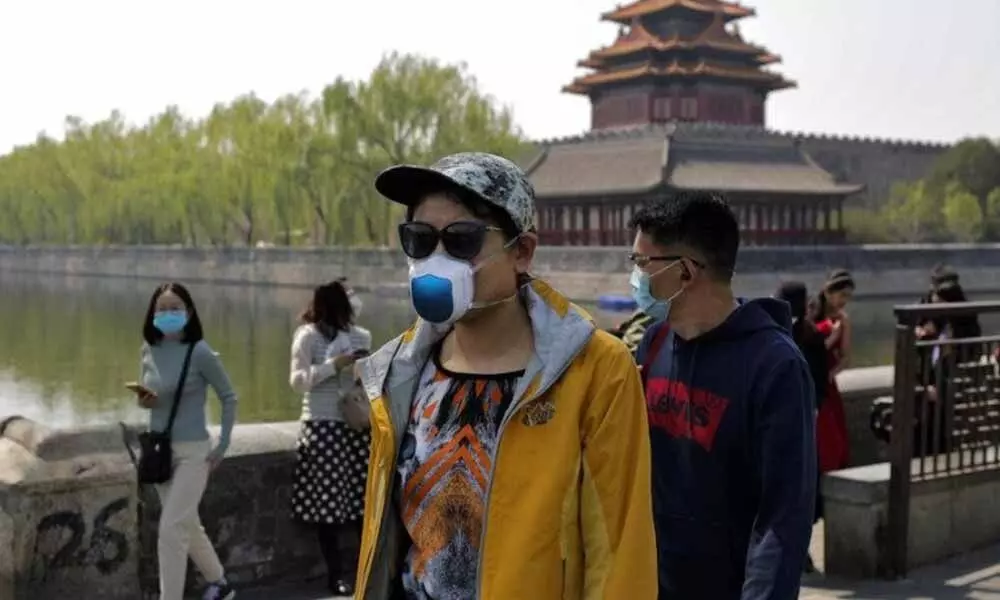Real-time monitoring needed to prevent second COVID-19 wave in China: Study
 China on Monday reported a few dozen new cases of coronavirus infection while no new confirmed or suspected cases in the epicenter city of Wuhan, where a 14-week lockdown is due to be lifted on Wednesday. (Photo | AP)
China on Monday reported a few dozen new cases of coronavirus infection while no new confirmed or suspected cases in the epicenter city of Wuhan, where a 14-week lockdown is due to be lifted on Wednesday. (Photo | AP)Given the substantial risk of the virus being reintroduced from abroad, and with economic activity increasing in China, there may be a second wave of infection in the province.
Beijing: While China's aggressive control measures may have halted the first wave of COVID-19 in areas outside Hubei province, the epicentre of the epidemic, real-time monitoring of the spread and severity of the deadly disease is needed to protect against a possible second wave of infection, researchers say.
According to the scientists, including those from the University of Hong Kong, given the substantial risk of the virus being reintroduced from abroad, and with economic activity increasing in China, there may be a second wave of infection in the province.
In their analysis, published in the journal The Lancet, they estimated that in regions outside Hubei, the instantaneous reproductive number of COVID-19, which is the average number of cases generated by a single infected individual during the outbreak, fell substantially after lockdown measures were introduced in January.
The scientists said the reproductive number has remained below one since then, suggesting that the epidemic has shifted from one that is expanding rapidly to one that is slowly shrinking.
However, based on mathematical modelling to simulate the impact of relaxing current control measures, the researchers suggest that premature lifting of these interventions will likely lead to transmissibility exceeding one again.
They cautioned that this may result in the second wave of infection.
According to the scientists, the findings are critical to countries globally that are in the early phases of lockdown, because they warn against premature relaxation of strict control measures.
However, the analysis did not delve into the effect of each intervention, or which one was most effective in containing the spread of the virus.
"While these control measures appear to have reduced the number of infections to very low levels, without herd immunity against COVID-19, cases could easily resurge as businesses, factory operations, and schools gradually resume, and increase social mixing," said Joseph T Wu from the University of Hong Kong who co-led the research.
Although control policies such as physical distancing and behavioural change are likely to be maintained for some time, he said, striking a balance between resuming economic activities and keeping the reproductive number below one is likely to be the best strategy until effective vaccines become widely available.
The scientists added that the probability of dying among confirmed cases of COVID-19, as officially reported outside Hubei, was 0.98 per cent, which is almost six times lower than in Hubei (5.91 per cent).
This varied substantially among different provinces, based on economic development and availability of health-care resources, the scientists said.
Among the ten provinces with the largest number of confirmed cases, case fatality ranged from zero per cent in prosperous regions like Jiangsu to 1.76 per cent in less developed provinces such as Henan.
"Even in the most prosperous and well-resourced megacities like Beijing and Shanghai, health-care resources are finite, and services will struggle with a sudden increase in demand," said Gabriel M Leung senior author of the research from the University of Hong Kong.
"Our findings highlight the importance of ensuring that local health-care systems have adequate staffing and resources to minimise COVID-related deaths," Leung said.
In the study, the researchers analysed local Health Commission data of confirmed COVID-19 cases between mid-January and 29 February, 2020, to estimate the transmissibility and severity of COVID-19 in four major cities -- Beijing, Shanghai, Shenzhen, Wenzhou.
The number of new daily imported and local cases were used to construct epidemic curves for each location by date of symptom onset, and reporting delays were incorporated in the modelling to calculate weekly reproduction numbers, the scientists noted.
They also modelled the potential impact of relaxing control measures after the first wave of infection for different scenarios with rising reproduction numbers.
In regions outside Hubei, the scientists said, control measures should be lifted gradually so that the resulting reproductive number does not exceed one, or the number of cases will progressively rise over the relaxation period.
According to their estimates, once elevated, simply tightening control interventions again would not reduce the burden back to its original level.
If this happens, it may require extra effort to drive the reproductive number below one in order to revert to the pre-relaxation level -- likely resulting in both higher health and economic loss, the researchers noted.
The study also noted that it had some limitations.
First, the estimated reproductive numbers were based on the reported number of confirmed cases, and the time and dates of symptom onset were unavailable for some provinces and relied on data derived from Shenzhen, the scientists said.
A limited number of simulations for relaxing control measures were done, they added, and these did not specify which interventions or public responses to the epidemic might correspond to each of the scenarios.














